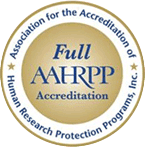POLICY
It is the policy of UTHSC-H that research involving a drug, other than the use of a marketed drug in the course of medical practice, must have an investigational new drug (IND) provided by the FDA, unless the protocol meets FDA exemptions.
It is the policy of UTHSC-H that investigational drugs, agents or biologics are stored appropriately and used only in approved research protocols under the direction of approved investigators.
Key Terms
Test article means any drug for human use, biological product for human use, medical device for human use, human food additive, color additive, electronic product, or any other article subject to regulation under the act or under sections 351 or 354-360F of the Public Health Service Act.
Clinical investigation means any experiment in which a drug is administered or dispensed to, or used involving, one or more human subjects. An experiment is any use of a drug except for the use of a marketed drug in the course of medical practice.
Investigational new drug means a new drug or biological drug that is used in a clinical investigation. The term also includes a biological product that is used in vitro for diagnostic purposes. The terms "investigational drug" and "investigational new drug" are synonymous.
Sponsor-Investigator means an individual who both initiates and conducts an investigation and under whose immediate direction the investigational drug is administered or dispensed. The term does not include any person other than an individual.
PROCEDURE
Submission: When the research involves a drug, agent or biologic, the Principal Investigator provides information on the drug, agent or biologic in the initial application via iRIS including but not limited to:
a. FDA determination status/issuance letter
b. IND Number
c. Rationale for exemption, if PI determines that IND is not required
d. If the source is not a FDA licensed facility, details regarding the purity, quality, stability and sterility of the test article
e. Plan for storage, dispensing, preparation and administration of test article.
f. List of investigators authorized to prescribe.
Review: ORSC Staff will verify the IND number provided by matching the information on the sponsor protocol, communication from sponsor or communication from FDA. In case the investigator holds the IND, the ORSC staff will verify the number provided by the investigator with the information provided by FDA.
If the research involves a drug, agent or biologic, and an IND number has not been provided, CPHS will determine if the research meets one of the FDA exemptions from the requirement to have an IND. ORSC Staff will document this determination in the meeting minutes.
The clinical investigation of a marketed drug or biologic does not require submission of an IND if all six of the following conditions are met:
a. it is not intended to be reported to FDA in support of a new indication for use or to support any other significant change in the labeling for the drug;
b. it is not intended to support a significant change in the advertising for the product;
c. it does not involve a route of administration or dosage level, use in a subject population, or other factor that significantly increases the risks (or decreases the acceptability of the risks) associated with the use of the drug product;
d. it is conducted in compliance with the requirements for IRB review and informed consent [21 CFR parts 56 and 50, respectively];
e. it is conducted in compliance with the requirements concerning the promotion and sale of drugs [21 CFR 312.7]; and
f. it does not intend to invoke 21 CFR 50.24.
A clinical investigation involving the use of placebo is exempt if it does not otherwise require IND submission.
A clinical investigation involving an in vitro diagnostic biological product (blood grouping serum; reagent red blood cells; anti-human globulin) is exempt if the diagnostic test was intended to be used in a diagnostic procedure that confirms the diagnosis made by another, medically established diagnostic product or procedure and the diagnostic test was shipped in compliance with 21 CFR 312.60.
Communication: If CPHS determines that an IND is required, ORSC Staff will communicate this to the Principal Investigator and CPHS approval will not be granted until the Principal Investigator submits the IND number or written communication from FDA that IND is not required.
CPHS shall ensure that the Principal Investigators plan for control of investigational material is appropriate. In general, pharmacy service should be used for storage and dispensing of the investigational material. CPHS may approve of a plan to store and dispense investigational material by an experienced Investigator or Study Coordinator in certain situations such as industry sponsored research with a plan for monitoring.
APPLICABLE REGULATIONS
1. 21 CFR 312.23(a)(4)
21 CFR 312.30
2. 21 CFR 312.53(c)
3. 21 CFR 312.60-62
4. 21 CFR 312.66
REFERENCES TO OTHER SOP
1. None.
ATTACHMENTS
1. Study Drug Panel – CPHS Application Form.
If you find errors in this document, contact [email protected]
Document Number: |
101-D01 |
Document Name: |
Investigational Drugs, Agents and Biologics |
Approved by: |
ORSC Director |
Effective: |
1 Aug 2008 |
Revision History: |
1 Jan 2009 1 Aug 2011 |
CPHS HELPLINE: 713-500-7943
iRIS HELPLINE: 713-500-7960
UTHealth Houston Compliance Hotline: 800-846-0632 (English & Spanish)
IRB OFFICE HOURS: Thursdays, 1–4pm via Teams Room
Committee for the Protection of Human Subjects
7000 Fannin St, Suite 1840Houston, Texas 77030
Phone: 713-500-7943
Fax: 713-500-7951
Email: [email protected]
Committee for the Protection of Human Subjects
IRIS Support: 713-500-7960
